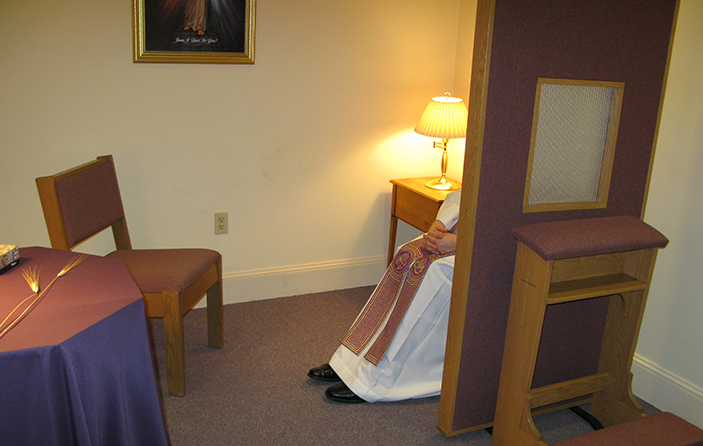
What: This sacrament is also referred to as the Sacrament of Reconciliation or Penance. Confession is a healing encounter with Jesus Christ for the forgiveness of sins. The Lord’s mercy, healing and grace are given to us through this encounter. In it Jesus also strengthens us to resist future or ongoing temptation. The Sacrament of Confession is a moment of accountability for us and before the Lord. The Lord’s forgiveness and mercy is infinite. Nothing we have done or could do can ever separate us from experiencing God’s forgiveness through this sacrament.
A sin is any choice we make that harms us or others. Sin by its very nature incapacitates us. Just as we could not effectively fix our own broken leg, neither can we be healed of serious sin by our own devices. By confessing our sins aloud to the priest, we allow the healing power of Jesus Christ – the great physician of souls – to come upon us. We open ourselves fully to His mercy and love. The priest speaks to us Christ’s own word’s of forgiveness, “I absolve you of your sins,” allowing us to hear and know the compassion of God. This special ministry was entrusted by Jesus to the Apostles, and the priests they ordained to minister to God’s people after them. Sin separates us not only from God, but from His family the Church. The priest in Confession represents the whole community of the faithful with whom we are also being reconciled.
Who: Any Catholic who is aware of serious sin should partake of the Sacrament of Confession. All Catholics should make at least one good Confession a year, the penitential seasons of Advent and Lent being an especially appropriate time for this. Catholics who have deliberately missed Mass or otherwise freely disregarded God’s law should not receive Holy Communion until a good Confession has been made.
When: Confessions are heard at St. Mary’s Church on Saturdays from Noon to 12:45 PM, or by advance appointment.
Where: The Reconciliation Room is located to the left of the church sanctuary. The room is arranged for anonymous or face to face confession according to the choice of the penitent.
How: Every good Confession starts with a sincere sorrow for one’s sins and a desire for forgiveness and a new life in the Lord.
Before approaching the sacrament, one should make a good Examination of Conscience – an honest review of life. A sample Examination of Conscience based on the Ten Commandments, is provided below.
Upon entering the Reconciliation Room, either sit in the chair for face to face Confession, or kneel behind the screen. Begin by making the Sign of the Cross while saying the words, “Bless me Father for I have sinned. It has been _____ weeks / months / etc. since my last Confession. These are my sins.”
Next confess your sins by type and number of times committed, as best you are able. Be confident in the knowledge that your Confession is under a seal of absolute secrecy, and that no sin is beyond God’s desire and power to forgive.
At this point the priest may ask you for clarification and / or offer you spiritual counsel.
He will then assign you a penance – prayers or actions to be completed after you leave the Reconciliation Room.
The priest will then ask you to make an Act of Contrition. A sample Act of Contrition is provided below, but you may use any version or even use your own words as long as they express sorrow for sin and an intention to avoid sin in the future.
Finally, the priest will give you absolution, speaking Christ’s own words of forgiveness. When he says “In the Name of the Father…” you should make the Sign of the Cross.
Upon leaving the Reconciliation Room, say your penance as soon as possible.
Above all, try to approach the Sacrament of Confession with confidence in God’s mercy. If it has been a long while since your last Confession, know that the Church (and the priest) rejoices at this new grace moving in your life. If you are not sure how to confess, just tell that to the priest and he will happily guide you along.
An Act of Contrition:
My God, I am sorry for my sins with all my heart. In choosing to do wrong and failing to do good, I have sinned against You Whom I should love above all things. I firmly intend, with Your help, to do penance, to sin no more, and to avoid whatever leads me to sin. Our Savior Jesus Christ suffered and died for us. In His name, my God, have mercy.
An Examination of Conscience for Adults
An Examination of Conscience for Children
Further Reading (PDF)